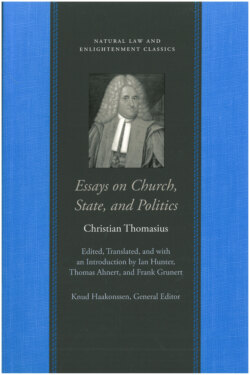Essays on Church, State, and Politics

Реклама. ООО «ЛитРес», ИНН: 7719571260.
Оглавление
Christian Thomasius. Essays on Church, State, and Politics
Отрывок из книги
ESSAYS ON CHURCH, STATE, AND POLITICS
ENLIGHTENMENT CLASSICS
.....
The second group, however, had a completely different viewpoint. [They argued that] such a way of dealing with God and Christ utterly contradicts not only the truth of the Old Testament but also that of the New and the teachings of Christ. Christ did not abolish the Ten Commandments, but commanded his disciples to follow the Commandment of Love, which includes all the others. He gave them emphatic advice that in this they should follow his model and example. Neither in the teachings of Christ nor in those of the apostles does one find much in the way of theological formulas. These arose a few hundred years later, when the passion and honesty of the first love had become rather lukewarm and dull. [According to this second group], the Lord Christ would not examine what people believed about the mysteries of God’s nature. Instead, given that he had himself purged the mystery of God’s will from the corrupt statutes of the Pharisees and had impressed [this] on his disciples, so he would much rather inquire into the works of love that he had commanded and would separate those who practiced these as sheep from goats, regardless of whether they could rehearse correct views about God, or prophesies, or miracles. Thus, they argued, it is not necessary to concern oneself with the improvement of the understanding, but one should much rather strive to improve the will. In accordance with the freedom bestowed by God, one must seriously and willfully and with true zeal attack the thing itself. One must renounce and rid oneself of the three vicious main desires: lust of the eye, lust of the flesh, and the haughty life. One must oppose and subdue those evil desires with vows of spiritual poverty, chastity, and of humble obedience. One must fortify the spirit by crucifying the flesh with all its lusts and desires, carefully arranging one’s life according to certain beautiful rules of living, carefully crafted by experienced minds. In addition, the inexperienced should choose a certain person from the skilled and experienced who would be charged with the direction of their conscience, and whose teaching and good advice they should obey with all simplicity, even when the advice sounds strange. All evil comes from Satan or from the corrupted reason, whose sly advances are no better avoided than by repudiating blind reason and making it a captive of faith. To summarize, we will call the first approach the dogmatic, which is the one most influential in orthodoxy and which is much given to heretic-mongering. But the other approach, which aims at the purification of the heart, while insisting on the secret and concealed exegesis of the Scriptures, we will call the esoteric or mystical approach.
Differences and similarities between the two groups
.....